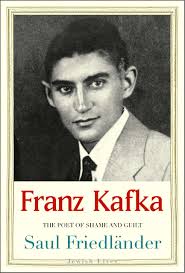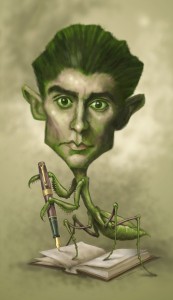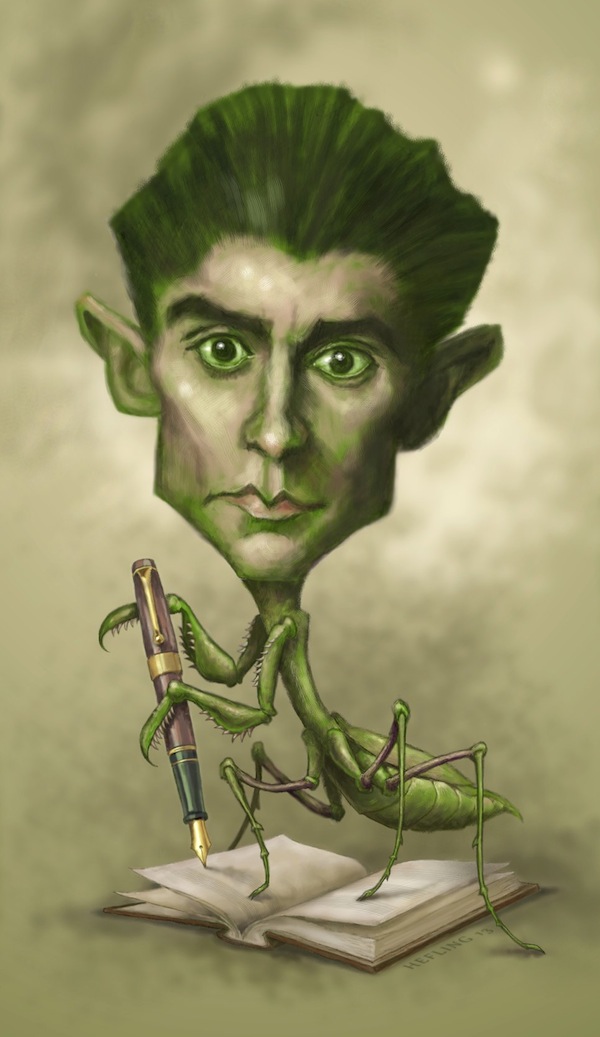 Franz Kafka: The Poet of Shame and Guilt
Franz Kafka: The Poet of Shame and Guilt
Saul Friedländer
Yale University Press
200 pages, $26.
HISTORIAN Saul Friedländer ventures into Franz Kafka scholarship with panache. Sex, he declares, is the hitherto missing key to interpreting “the poet of shame and guilt.” He states his main thesis thus: “The issues torturing Kafka most of his life were of a sexual nature.” One of his arguments is that Kafka, while pretending that he wanted to marry a woman, in fact desired men—and young people of both sexes.
Kafka was engaged to Felice Bauer, twice, and also to Julie Wohryzek, but none of the marriages ever materialized. He was forty and dying from tuberculosis when he met Dora Diamant, a 25-year-old from a Jewish Orthodox Eastern European family who lived in Berlin. He moved out of his parents’ apartment in Prague to be with her. They were together until his death a year later, in June 1924.
He also dated Milena Jesenská from Vienna, the only non-Jewish woman he seriously courted, though she was married to a Jew. Milena remarked in a letter: “I understand very well that for him this great passion means rescue from sex.” Kafka himself once wrote to Max Brod: “You are right in saying that the deeper realm of sexual life is closed to me.” In 1922, he asked himself in his diary: “What have you done with your gift of sex? It was a failure, in the end that is all that they will say.”
Kafka was clearly unhappy about his love life. But was it because he was gay? His female characters are often drawn as base and menacing. His descriptions of actual women are hardly more flattering. He reported to Brod on women he flirted with: “Agathe is very ugly and so is Hedwig.” Upon first meeting his future fiancé Felice Bauer, he paid attention to details: “Bony, empty face that wore its emptiness openly. … Blonde, somewhat straight, unattractive hair, strong chin.” The fact that Kafka was able to render such a swift and decisive verdict on her appearance might suggest that he was straight, after all.
That Kafka was gay is speculative but not implausible. Friedländer finds a diary entry from 1912 that’s especially revealing: “two handsome Swedish boys with long legs that are so shaped and tight that the best way to get at them would be with the tongue.” (The age of the boys is unclear.) While working on The Castle, his last, unfinished novel, Kafka wrote in his diary: “Struggle on the road. … Happy little B. in all his innocence … specially his outstretched leg in its gray rolled-up sock, his aimless wandering glance, his aimless talk … he wanted to go home with me.” In another passage he refers to a fellow train passenger who had a “big member” bulging in his pants.
with long legs that are so shaped and tight that the best way to get at them would be with the tongue.” (The age of the boys is unclear.) While working on The Castle, his last, unfinished novel, Kafka wrote in his diary: “Struggle on the road. … Happy little B. in all his innocence … specially his outstretched leg in its gray rolled-up sock, his aimless wandering glance, his aimless talk … he wanted to go home with me.” In another passage he refers to a fellow train passenger who had a “big member” bulging in his pants.
It’s harder to evaluate his descriptions of male acquaintances. One friend is described as “handsome,” another as “good-looking.” Are these indicative of sexual attraction, or simply observations? That handsome friend, Jewish writer Franz Werfel, is described in Kafka’s diary as “stooped, half reclining even in the wooden chair, the beautiful profile of his face pressed against his chest.” He wrote to Max Brod about dreaming that he gave Werfel a kiss, which would cause him to “stumble into the middle of [Hans] Blüher’s book,” namely The Role of Eroticism in Male Society.
Friedländer then turns to Kafka’s fiction for clues. In The Castle, K. dreams that
a secretary, naked, very like the statue of a Greek god, was being hard pressed by K. in battle. That was quite comical, and in his sleep K. smiled gently at the way the secretary was being constantly startled out of proud posture by K.’s advances and quickly had to use his raised arm and clenched fist to cover up his exposed parts, but he was not yet quick enough. The battle did not last long, for step by step, and very big steps they were too, K. advanced. Was this even a battle? There was no real obstacle, only every so often a few squeaks from the secretary. This Greek god squeaked like a girl being tickled.
But what are we to make of the curious aside, “That was quite comical”?
Friedländer’s first chapter, “The Son,” reviews Kafka’s relationship with his father and hints at a Freudian interpretation. A letter written by the 36-year-old Kafka has usually been taken as proof that Kafka and his father had a toxic relationship, beginning: “You asked me recently why I maintain that I am afraid of you.” But Friedländer dismisses the standard interpretation: “One does not perceive any grievous offense from Hermann’s [Kafka’s father] side, beyond the minor irritations unavoidably part of the relations between parents and children.” Indeed Friedländer views the Kafkas as basically a happy, if somewhat oppositional, family with a typical “generational confrontation.” The father fits the mold of the “self-made Jew” who climbed society’s strata from their traditional upbringing only to be criticized by their relatively privileged sons for their materialism. According to Friedländer, “Franz, knowingly or not, stroked partly fictitious grievances, wallowed in the ensuing family dramas not only because it fed his notorious masochism but also—and mainly—because symbolically at least it established his difference from surrounding society.”
The discussion of Judaism is better. “You ask me if I am a Jew,” he wrote to Jesenská. Of course he didn’t answer, but meandered through anecdotes about Jewish intellectuals. Kafka’s classmates and circle of friends in adulthood were mostly Jewish. Obsessed with questions of Jewish identity, they often gave contradictory answers. Friedländer follows Kafka’s multifaceted engagement with Jewish themes—law and practice, Talmud and mysticism, Hebrew and Yiddish, Zionism, culture, assimilation, anti-Semitism. Kafka was usually critical, well-informed, and rarely obsessed. His Zionism resembles his unconventional sexuality—detailed, realistic fantasies but zero action. One quote speaks volumes about Kafka’s Jewish sensibility: “What have I in common with Jews? I have hardly anything in common with myself.”
Friedländer’s attempt to explain Kafka through sex is intriguing, but in the end it is overly ambitious. Still, Kafka might concur with Friedländer that the blame lies neither with the father nor with society. As if rushing in the final instance to admit guilt, Kafka concludes his letter to his father, “Not even your mistrust of others is as great as my self-mistrust, which you have bred in me.” But can that self-blame be traced to sexual matters?
Referring to “the gift of sex,” Kafka adds: “Sex keeps gnawing at me; hounds me day and night; I should have to conquer fear and shame probably sorrow too to satisfy it; yet on the other hand l am certain that I should at once take advantage with no feeling of fear or sorrow or shame, of the first opportunity to present itself quickly, close at hand, and willingly.” By then, however, he was dying of tuberculosis. The shame and sorrow surrounding sex are clear, but there’s also a desire to seize the first opportunity that comes along. Alas. Kafka is characteristically vague about the object of his desire, which itself suggests an unspoken or unspeakable secret that he is yet unwilling to disclose.
Yoav Sivan is an Israeli journalist based in New York. He maintains a website at www.YoavSivan.com.







Discussion1 Comment
His level of avoidance and absence of lasting love relationships suggest that he was, at least, conflicted about his sexuality. He is clearly curious about both genders from the information included above, and the multiple engagements that never turn into marriage are also consistent with someone who is gay or bi, and wants to cover it up.